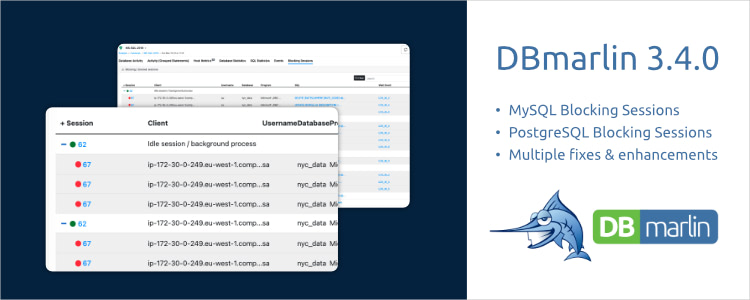DBmarlin 3.4 released - with Blocking Sessions for MySQL and PostgreSQL

We are pleased to announce version 3.4 of DBmarlin where we have added Blocked Sessions for MySQL and PostgreSQL as a beta feature as well as additional SQL Stats which can now be enabled in the settings screen.
Blocked Sessions for MySQL and PostgreSQL
Following the release of Blocked Session capture for Oracle and SQL Server in our 3.2 release, we have been working hard to add the same capability to the other databases we support. In 3.4 we have now added the feature for customers running MySQL and PostgreSQL databases. Currently it is a hidden beta feature which is turned off by default but if you would like to try it, please get in touch and we can provide the steps to enable it.
Blocked queries pose a major challenge for database analysts and engineers tasked with managing performance at scale. Identifying the head blockers - the underlying problematic queries that cause cascading locks on database resources - is crucial to troubleshooting and addressing database performance issues. However, this can be challenging, particularly when conducting historical analysis after the locking may have already disappeared.

The Blocked Sessions screen lets you see the blocking trees with the head blocker at the top of the tree and any blocked sessions are shown indented below it for the time period you select. This allows you to troubleshoot both ongoing locking issues or retrospectively after the event. From the Blocked Sessions screen you can drill down further into any of the sessions or SQL statements or click on the lock wait event which will take you to a knowledge-base article describing the lock event and what can be done to avoid it.
Enabling the collection of additional SQL Statistics
There is now a new Settings screen for SQL Statistics where you can choose which set of statistics you would like collected for each database technology type. Each database vendor provides their own set of SQL statement-level statistics. Some like duration, executions or CPU time can be very useful in understanding SQL performance problems while others are a little more esoteric but still useful in certain scenarios. We therefore let you as a customer decide which ones you consider to be of value. Remember that each one you turn on will incur some storage space in your DBmarlin repository so best to only enable the ones you really need.
Other improvements
We have now changed all charts within the product to have improved granularity with more data points per chart.
Ready to try DBmarlin?
If you would like to find out more about DBmarlin and why we think it is special, try one of the links below.
- Get hands-on without an installation at play.dbmarlin.com
- Download DBmarlin from www.dbmarlin.com, with one FREE standard edition license, which is free forever for 1 target database.
- Join our new community at https://community.dbmarlin.com/invitation?code=74020A

